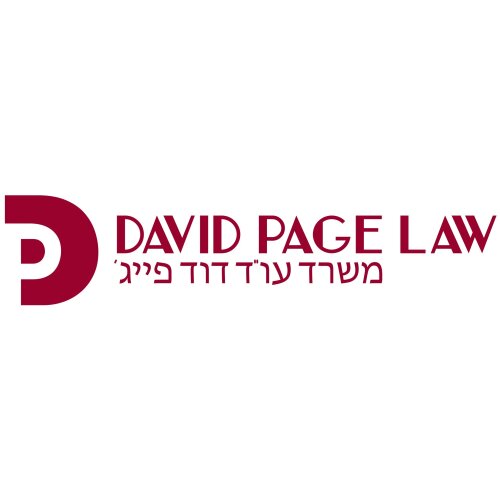Best Aviation Lawyers in Israel
Share your needs with us, get contacted by law firms.
Free. Takes 2 min.
Or refine your search by selecting a city:
List of the best lawyers in Israel
About Aviation Law in Israel
Aviation law in Israel governs the legal aspects of air travel and transportation within the country's jurisdiction. It encompasses a wide range of areas, including regulatory compliance, safety standards, aircraft operation, airspace management, and environmental impacts. The Israeli Civil Aviation Authority (CAA) is the primary regulatory agency overseeing aviation activities. Given the strategic geographical location of Israel and its thriving aviation industry, these laws are crucial to maintaining safety and efficiency in both domestic and international air travel.
Why You May Need a Lawyer
There are several scenarios where you might need legal assistance in the field of aviation. These include dealing with aircraft purchase agreements, resolving disputes over aviation insurance claims, submitting applications for aviation permits and licenses, negotiating airline labor agreements, addressing issues related to aircraft accidents and liabilities, or handling regulatory compliance matters. Lawyers specializing in aviation law can offer expert guidance and representation to ensure that the complexities of aviation regulations and disputes are navigated effectively.
Local Laws Overview
Israel's aviation laws are heavily influenced by international standards, primarily those set by the International Civil Aviation Organization (ICAO). Key aspects include:
- Strict adherence to safety regulations and procedures in aircraft operation and maintenance.
- Regulations governing pilot licensing and certification, ensuring pilots meet both national and international standards.
- Environmental regulations focused on reducing noise and emissions from aircraft.
- Passenger rights laws to protect consumers, especially regarding flight delays, cancellations, and lost baggage.
- Security protocols to safeguard against terrorism and unlawful interference.
Frequently Asked Questions
1. What is the role of the Civil Aviation Authority in Israel?
The Civil Aviation Authority (CAA) is responsible for regulating and overseeing all aviation activities in Israel, ensuring safety, security, and compliance with national and international standards.
2. How can I address a dispute with an airline?
For disputes with airlines such as delays or cancellations, you can first contact the airline’s customer service. If unresolved, you may seek arbitration or legal recourse through a specialized aviation lawyer.
3. What are the qualifications required for a pilot license in Israel?
Pilots need to complete approved training programs, pass medical examinations, and meet flight hour requirements as stipulated by the Israeli CAA. They must also pass theoretical and practical exams.
4. What can I do if my baggage is lost or damaged by an airline?
You should file a report with the airline as soon as possible. Review their baggage claim policies, and if necessary, seek legal advice to ensure fair compensation.
5. How are aircraft accidents investigated in Israel?
The Investigation Unit of the Israeli Ministry of Transport handles investigations, focusing on technical analyses to prevent future incidents, and doesn't assign legal blame. Legal proceedings may follow separately.
6. Are there laws protecting passenger rights in Israel?
Yes, Israeli aviation laws include provisions for passenger rights similar to the European Union regulations, covering compensation for delays, cancellations, and denied boarding.
7. Do I need a special permit to operate a drone in Israel?
Operating a drone in Israel often requires a permit, particularly for commercial activities. The CAA provides guidance on the necessary requirements and restrictions.
8. What are the environmental regulations for airlines in Israel?
Airlines must comply with regulations aimed at reducing emissions and noise pollution. This includes adhering to operational procedures and limits set on emissions by the CAA.
9. How does Israel regulate private aircraft ownership?
Ownership is regulated through registration requirements with the CAA, including maintaining certifications of airworthiness and compliance with import/export restrictions.
10. Can foreign airlines freely operate in Israeli airspace?
Foreign airlines must adhere to bilateral agreements and obtain permits from the Israeli government, ensuring compliance with local and ICAO regulations.
Additional Resources
Several resources can assist those seeking legal advice in aviation, including:
- The Israeli Civil Aviation Authority (CAA) for regulatory information and guidance.
- Transportation Law organizations that specialize in aviation-related cases.
- International Civil Aviation Organization (ICAO) for international standards and regulations.
- Israel Bar Association for finding qualified aviation law specialists.
Next Steps
If you need legal assistance in aviation law, consider the following steps:
- Research and identify experienced aviation lawyers or law firms in Israel.
- Schedule consultations to discuss your needs and the specifics of your situation.
- Gather all relevant documentation and information to facilitate a thorough legal review.
- Consider seeking specialist advice for complex issues, such as international regulations or substantial claims.
- Stay informed about current aviation laws and ongoing developments in the sector to actively manage any legal concerns.
Lawzana helps you find the best lawyers and law firms in Israel through a curated and pre-screened list of qualified legal professionals. Our platform offers rankings and detailed profiles of attorneys and law firms, allowing you to compare based on practice areas, including Aviation, experience, and client feedback.
Each profile includes a description of the firm's areas of practice, client reviews, team members and partners, year of establishment, spoken languages, office locations, contact information, social media presence, and any published articles or resources. Most firms on our platform speak English and are experienced in both local and international legal matters.
Get a quote from top-rated law firms in Israel — quickly, securely, and without unnecessary hassle.
Disclaimer:
The information provided on this page is for general informational purposes only and does not constitute legal advice. While we strive to ensure the accuracy and relevance of the content, legal information may change over time, and interpretations of the law can vary. You should always consult with a qualified legal professional for advice specific to your situation.
We disclaim all liability for actions taken or not taken based on the content of this page. If you believe any information is incorrect or outdated, please contact us, and we will review and update it where appropriate.
Browse aviation law firms by city in Israel
Refine your search by selecting a city.
















